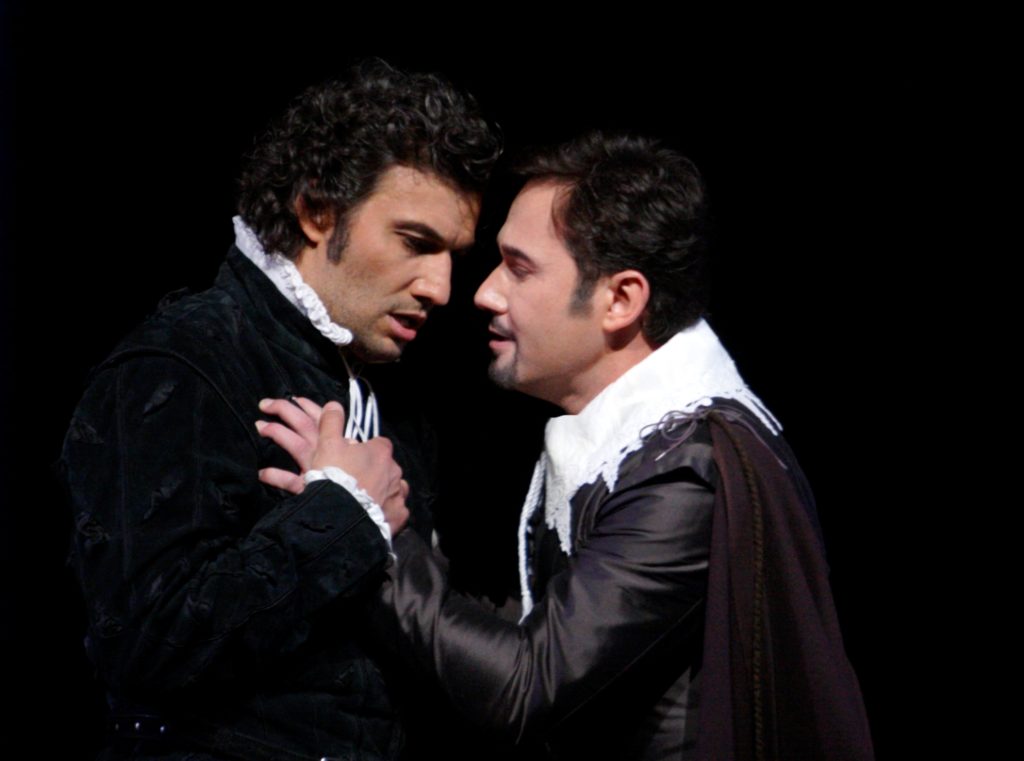Opera fans who are lgtbq or + may wonder if we are represented in opera. We are, but, like many of us have been in everyday life, we do not announce our presence in opera with great fanfare. In this overview of lgtbq+ folx in opera, I present two gay men, two men who may be homosexual, one man who may be bisexual, and a lesbian. This is not intended to be a comprehensive review. For that, I encourage you to read this review and this. I do not review the numerous operatic pants roles, despite being a mezzo soprano, nor do I address countertenors. These roles are contrivances designed to address very different needs of opera performance and cultural confines and may be better left for a discussion of gender presentation rather than one of sexuality.
In every instance, I provide links to brief synopses of each opera. These can be found in the initial mention of the opera title. Where I have been able to find libretti, I provide links to them. In other cases, I have linked to YouTube videos, which provide subtitles. In some cases, you’re on your own.
Before I start, I should disabuse you of a couple of things. First of all, I don’t hold a degree in music. All my learning is hard won over years of intensive listening and occasional investigation. As such, I’m sure there are huge blind spots in my knowledge and I apologize for them right now. Second, you could be forgiven if you have assumed I am a gay man. I am not. I am a lesbian.
Rodrigue/Rodrigo in Don Carlo(s), by Giuseppe Verdi, 1867 [libretto]
Robert Hugill, composer, singer, and journalist, suggests that Rodrigue and Don Carlos have a sexual relationship. The duet, C’est moi, Carlos, sung by Rodrigue (French for Rodrigo) and Don Carlos, is certainly is suggestive of a sexual relationship. If you’re thinking that the orchestral introduction is explicit, it is. There are no accidents in Verdi operas and Verdi is known as the exemplar of characterization. If you still doubt that Rodrigue loves Don Carlos, here is amusing commentary from opera buffs.
In the case of Don Carlos, however, I believe Hugill is wrong. Don Carlos states multiple times that he is in love with Elisabeth. Perhaps he is bisexual. At times we forget that opera characters are not real because they seem otherwise on stage.
Verdi further defines Rodrigo’s character near the finale in his death scene in which he sacrifices his life for Don Carlo. Rodrigo is sung by Dmitri Hvorostovsky. Is Rodrigo’s touching of Don Carlo at 2:25 that of one lover to another? Finally, note the prominent display of the crucifix Rodrigo is wearing at 7:24 signifying his sacrifice of his own life for that of Don Carlo.
Lastly, here is a series of essays discussing homosexuality in Italian culture during the 19th and early 20th centuries.
King Mark in Tristan und Isolde, by Richard Wagner, 1859
Tristan has killed Morold and captured Isolde his fiancé in order to bring her to King Mark of Cornwall, who intends to marry her. Isolde despises Tristan and asks her maid, Brangäne, to give her a death potion that Isolde plans to drink along with Tristan. Instead, Brangäne gives her a love potion, which Isolde and Tristan drink aboard Tristan’s ship as they return to Cornwall. Thus begins the all-consuming love triangle between Tristan, Isolde, and Mark.
Mark, who raised the orphaned Tristan and is also his uncle, may or may not be in love with Tristan. That is up to the opera goer to decide, but the emotional content of King Mark’s lament at discovering that Tristan betrayal goes far beyond disappointment in the loss of Isolde. In fact, Isolde is mentioned only once in his lament. Here are two renditions of the lament: The first provides a brief translation through subtitles. The second is a complete performance of the lament. While Mark’s countenance appears as one who is dead in this second rendition, it is not clear what is intended. Is he dead because of his loss or perhaps because he represents an unacceptable form of love?
While the emotional urgency of the love between Tristan and Isolde in the opera is intense and captivating, the tragedy of King Mark is subtle and three dimensional in a way that Tristan and Isolde are not.
Here are a couple of discussions of the work, which explore chivalry and its potential meaning within the story and the possibility that King Mark is homosexual.
Countess Geschwitz in Lulu, by Alban Berg, 1937 (1979)
There are two dates for this opera because Berg did not complete it before his death. It was ultimately completed in 1979. The plot is complicated and I will not review it here. Suffice it to say that Countess Geschwitz, who loves Lulu, tries to save Lulu in two instances in the opera. In the end, both Lulu and Countess Geschwitz are murdered by Jack the Ripper. The soprano, Barbara Hannigan, explains why she enjoys singing the part of Lulu.
Timothy Laughlin and Hawkins Fuller in Fellow Travelers, by Gregory Spears, 2016
Fellow traveler refers to someone who is sympathetic to the politics of a particular organization without being a member. In this opera, the term takes on a double meaning to include sexual orientation. In this beautiful duet, “Bermuda,” Hawkins and Timothy engage in their first sexual encounter.

